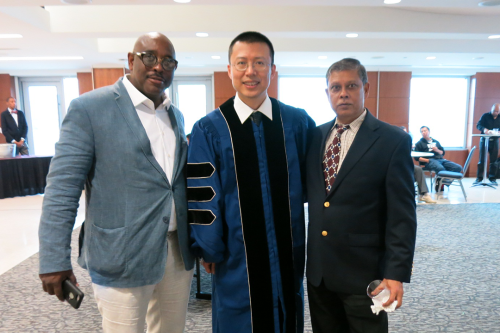About
Founded in 1935, GW’s Department of Statistics was the first department of its kind in the United States to be housed in a college of arts and sciences. Since then, GW Statistics — a STEM-designated discipline — has established itself as a global leader in statistical education and research.
Thanks to our location in the heart of Washington, D.C., students benefit through our access and collaborations with the Environmental Protection Agency, the National Cancer Institute, the Department of Labor and other organizations that are using statistics to make remarkable advances every day. We are proud to be home to a welcoming community of diverse students from all over the world. Our faculty include Guggenheim and Ford Foundation Fellows, as well as leaders in the Institute of Mathematical Statistics Fellowship and the American Statistical Association, and they receive prestigious research grants from the National Science Foundation, the Department of Defense and more.
Connect With Our Community
"The GW Statistics Department has served as my academic family for the last four years. I honestly can't imagine an environment that would have been more helpful in advancing my career as an academic, or one that would do it in a more enjoyable way."
Eric Solis
BS ’09, Statistics and Mathematics
Our Mission
Teaching
The GW Department of Statistics trains students to function as informed citizens and understand statistical arguments in their chosen specialty. Our faculty prepare majors, minors and graduate students for successful careers in the field, while non-majors are educated in foundational statistics concepts.
Particularly for majors, a deeper understanding of the theoretical foundation of statistics is essential. This theoretical training is complemented by advanced training in modern data analysis skills. Statistical reasoning plays an increasingly important role in developing and analyzing programs related to the health, safety, economic prosperity, social justice and general quality of life of modern societies. Statistical principles are critical to the collection of valid data, and statistical analysis is critical to interpreting that data.
Service
Our mission includes service to Washington, D.C.-based scientific and administrative agencies, and to the profession as a whole — on the local, national and international levels. This service takes many forms, including editorial and administrative, as well as expert advice and consultation to professional associations.
Located in an area with a high concentration of statisticians, the department takes seriously its access and considers it a responsibility to serve the general public as well as the statistics profession.
Research
We believe that a healthy research program includes both problem-driven research and basic research of general interest. The research program is the foundation of our PhD in Statistics, and our doctoral students, in turn, greatly enrich the research enterprise.
Our faculty produce high-quality research in both theoretical and applied areas of statistics and probability. They receive prestigious grants from organizations such as the National Science Foundation and the Environmental Protection Agency, as well as awards from the American Statistical Association, the International Statistical Institute, the Guggenheim and Ford Foundations and more.
Statistics at Work
Explore the many ways you can apply a degree in statistics to the professional world.
Economics
- Analyzing key economic indicators and financial markets; conducting economic modeling
- Developing models that help to manage risk and identify opportunities
- Forecasting models and conducting credit analysis
Government
- Developing government regulations, including for financial markets, pollution standards and drug approvals
- Designing simulations for national defense strategy; assessing logistics and national security risks
- Conducting sample surveys and censuses; maintaining confidentiality of respondents
Law Enforcement and Justice System
- Reviewing data to assist in determination of legal judgments
- Analyzing DNA tests
- Consulting in discrimination cases
Business and Marketing
- Data mining to discover customer patterns, needs and wants
- Assessing new product viability
- Sampling and estimating accounting discrepancies
Health and Medicine
- Designing and analyzing biomedical research experiments for medical advances, clinical trials, pharmaceutical research and epidemiology
- Linking genes to outcomes








